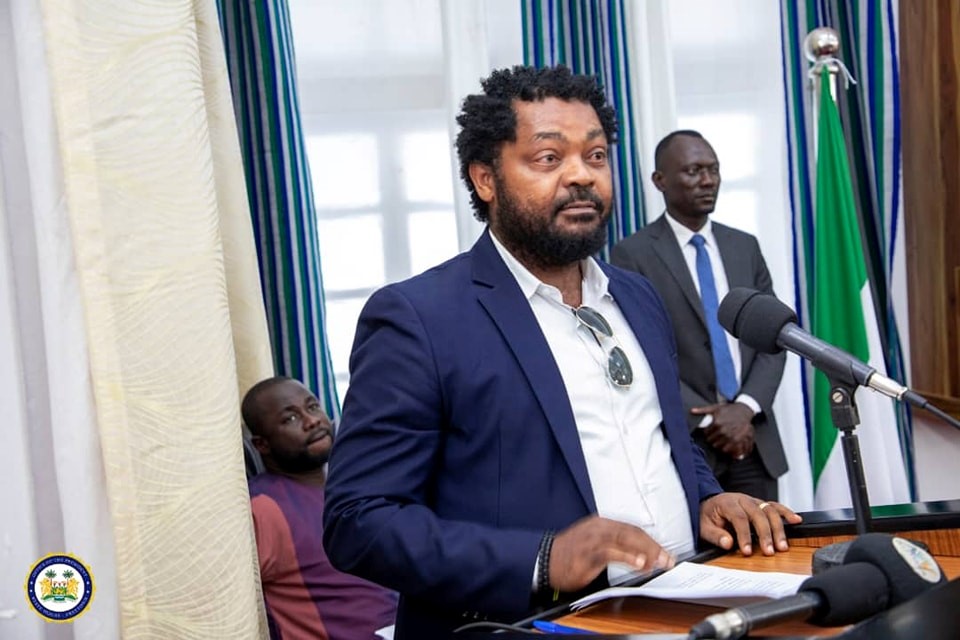President of the Sierra Leone Association of Journalists (SLAJ), Ahmed Sahid Nasralla has said free, fair and non-violent elections is critical to the development of any democratic society. He said modern democracies have succeeded or failed depending on how free, fair, peaceful and credible their elections have been.
Speaking on the role of the media in ensuring free, fair, non-violent presidential and parliamentary elections in June this year, Nasralla said: “Elections are a fundamental aspect of democracy, providing citizens with the power to elect their leaders and hold them accountable. However, recent global events have highlighted that this is not always the case, with many countries experiencing electoral violence and fraud”.
He said the International Institute for Democracy and Electoral Assistance (IDEA), there were 180 elections worldwide by 2020, and only 63% of them were considered free and fair, adding that in Africa, the numbers are even worse, with only 37% of elections being free and fair within the same period.
“To ensure free, fair and non-violent elections, starts with information. If the information about the elections is not correct or credible the outcome will also not be credible. Citizens need the right information to help them make informed choices about who should lead them. And that’s where the media comes in.
“To ensure free, fair and non-violent elections also requires all stakeholders to play their roles professionally and effectively. One of the critical stakeholders in this regard is the media, whose role cannot be overemphasized”.
President Nasralla reminded that the media has a crucial role to play in providing accurate and unbiased information to citizens about the elections.
He said the media serves as watchdog during the electioneering period by monitoring the electoral process and reporting irregularities, thereby promoting transparency and accountability, adding that the media also play a crucial role in educating voters on their rights and responsibilities, thereby promoting an informed electorate.
“Voters need to be educated also about the electoral system and processes- how to register to vote, how to verify your name on the voters list, how to collect your voter ID, how to vote on polling day. Voters further need to be educated about electoral laws and punishment; and about the candidates and political parties that are contesting the elections and their track-records and manifestos.” Nasralla stated.
He called on the media to make its platform accessible by/to all candidates, all political parties and the ordinary people, including minority groups, without discrimination. He further encouraged them to promote dialogue among politicians and citizens during the elections through the organisation of political debates and discussion programs.
The SLAJ president said there is also the collaborative role of the media, working with other stakeholders- the Elections Management Boards (EMB), security sector and civil society organisations to ensure free, fair and peaceful elections.
He appealed to EMBs to organising trainings for journalists reporting on the elections to ensure ethical standards, professionalism and non-partisanship or independence throughout the electoral cycle.
Speaking on the challenges, President Nasralla said latest reports by the Media Foundation for West Africa (MFWA) revealed that Sierra Leone’s media environment is generally free and diverse, with hundreds of radio stations and newspapers, as well as TV stations and online news portals operating in the country.
He said despite this, there have been instances of media intimidation, harassment and censorship by governments, security forces and political parties and their fanatic supporters.
He said in the 2018 elections, there were also cases of hate speech, fake news and incitement to violence by some media outlets, which contributed to the tense atmosphere and electoral disputes.
“Another challenge is the digital space which is now commonly called social media. The traditional or legacy media has no more control over content creation as anyone with a smart phone can now easily create their own content and post on the information highway.
“Issues of fake news, disinformation, propaganda and hate speech and inciteful messages are common place in this new and diverse space, thereby confusing the voters on what to believe and not to believe.
“There is also the challenge of media poverty which is making journalists vulnerable to the dictates of politicians”.
He said as the umbrella body for the media in Sierra Leone, SLAJ is working with several donor partners including the National Democratic Institute (NDI), National Endowment for Democracy (NED), Irish Aid, UK Aid (FCDO), the EU, the UNDP, and the Elections Commission Sierra Leone (ECSL) to implement projects aimed at ensuring free, fair, inclusive, transparent, and non-violent elections.
Nasralla said to ensure that the 2023 elections are free, fair and non-violent; “the media should focus on the providing accurate, balanced and factual information to voters, candidates and stakeholders, including on the electoral laws, procedures, and results.
“Avoid sensationalism, propaganda, and hate speech that could incite violence, discrimination, or prejudice against any group or individual.
“Promote ethical standards and professional conduct among journalists, editors, and media owners, through training, codes of ethics, and self-regulation mechanisms.
“Monitor and reporting on electoral irregularities, malpractices, and violence, with due diligence and impartiality, to help prevent or redress any violations of the law or human rights.
“Collaborate with the electoral management body, civil society, and other stakeholders to promote a peaceful and inclusive electoral environment, through public debates, voter education, and conflict prevention initiatives”.

